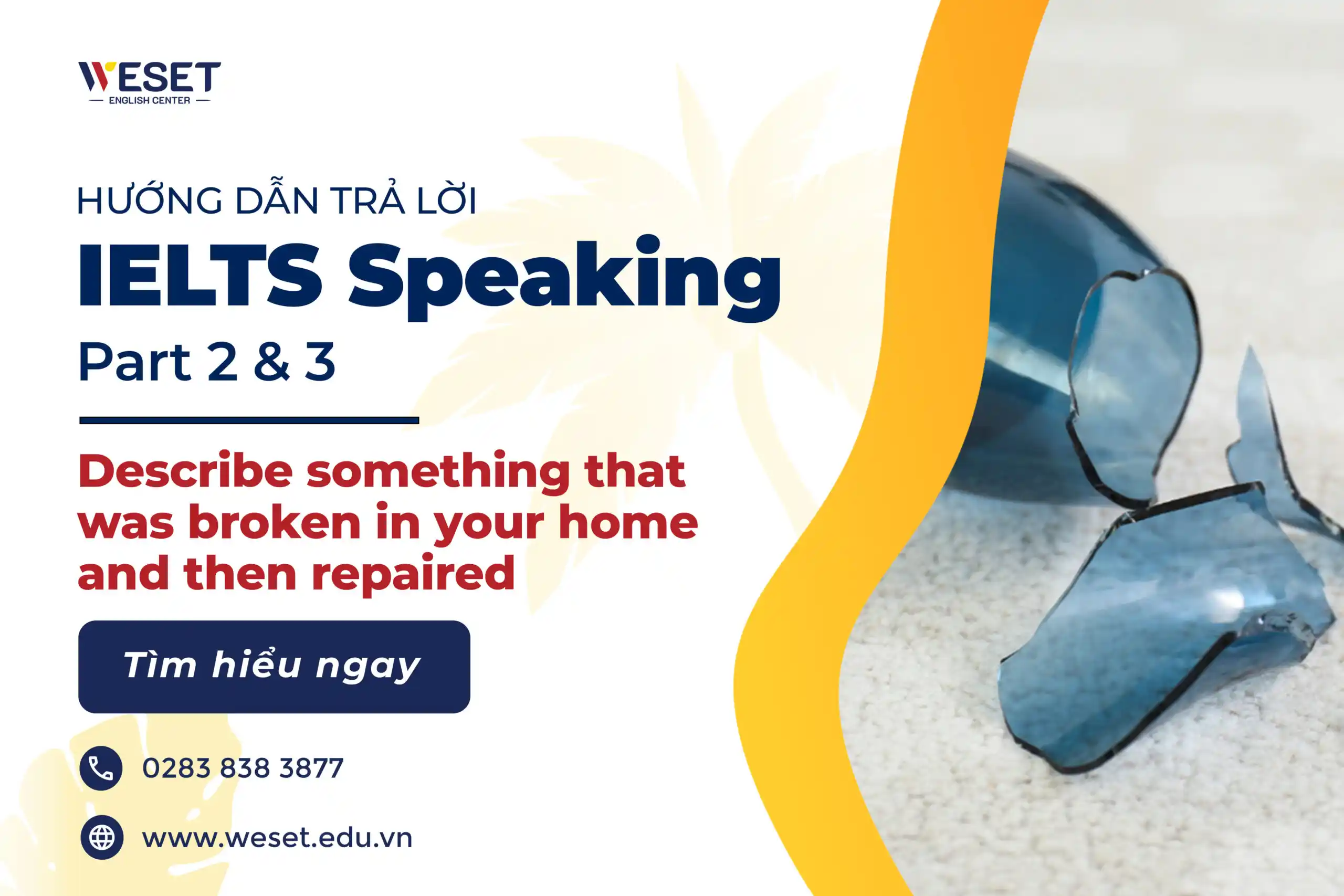Trang chủ Blog Bài thi IELTS mẫu Bài mẫu IELTS Sample Speaking IELTS Speaking: Describe something that was broken in your home and then repaired
IELTS Speaking: Describe something that was broken in your home and then repaired
- WESET
- Bài mẫu IELTS Sample Speaking, Bài thi IELTS mẫu, Blog
MỤC LỤC
Cùng WESET luyện tập với đề thi IELTS Speaking mẫu “Describe something that was broken in your home and then repaired” với gợi ý trả lời chi tiết, giúp bạn tự tin ghi điểm hiệu quả.
Part 2: Describe something that was broken in your home and then repaired
You should say:
- What it is
- How it was broken
- How you got it repaired
- And how you felt about it
Well, usually, when most of the electrical equipment in my family breaks down, I will probably purchase newer models rather than have the damaged ones fixed. However, I guess that is not the case for our family’s digital camera.
It was a vintage Sony digital camera, which was passed down from my grandfather to my father, and then to me. If my memory serves me right, my grandpa bought it in 2003 to store my family’s summer trip’ photos. It cost him around 700$, which was such a fortune at that time. I still remember that back in the day, I was so obsessed with this camera as it has a 3-megapixel sensor with enough resolution to make 7×5-inch prints, more than enough for online use. After 20 years, the camera became a company with my family since it captured many valuable memories of us. Unfortunately, just about a month ago, while my sister was taking photos for her school’s camping trip, it suddenly stopped functioning. Despite all of our possible effort to repair it, the situation was to no avail. We found ourselves down on our luck due to the fact that this camera was no longer under warranty. Lucky for us, one of my close friends knows a very skilled camera repairman, so we sent our broken camera to him. The good thing was he had all of the essential supplies and finally, our camera got fixed.
This experience was undoubtedly an unpleasant one. It would be a nightmare for me if this device was completely broken as it was like a part of my childhood.
Từ vựng nổi bật:
- not the case (phrase) /nɑt ðə keɪs/: không giống với
- fortune (n) /ˈfɔrʧən/: gia tài
- obsessed (v) with /əbˈsɛst wɪð/: ám ảnh với
- megapixel (n): điểm ảnh
- sensor (n) /ˈsɛnsər/: cảm biến
- resolution (n) /ˌrɛzəˈluʃən/: độ phân giải
- print (n) /prɪnt/: bức ảnh
- capture (v) /ˈkæpʧər/: chụp
- to no avail (idiom) /tu noʊ əˈveɪl/: không thành công
- down on someone’s luck (idiom) /daʊn ɑn ˈsʌmˌwʌnz lʌk/: hết may mắn
- under warranty (phrase) /ˈʌndər ˈwɔrənti/: trong hạn bảo hành
Part 3:
- Is the quality of products worse than before?
Definitely yes, I believe that most, if not all, businesses care more about profits than quality. If products still lasted for years like they once did, companies wouldn’t be able to take advantage of customers in the long run. Thus, in order to keep their customers coming back to them for more money, they manufacture products that they are aware won’t last and break after a year or two.
- What kinds of things do people like to repair by themselves?
Most people attempt to repair various pieces of simple furniture at home as sending these interiors to repair stores may be too rich for their blood. For instance, my father usually uses tape to repair a chair’s damaged leg or tries his best to glue a broken mirror back together to avoid splurging on fixing simple stuff.
- Why do people like to get their mobile phones repaired in specialized stores?
I guess a person who learns how to repair a mobile device can discover that the expense of purchasing the necessary equipment or parts is high. For example, because the cost of touch screens on smartphones are expensive and they require specialized technique to be replaced, people often have the option to take their current phone to a repair facility where they can snap up a bargain.
Từ vựng nổi bật:
- profit (n) /ˈprɑfət/: lợi nhuận
- last (v) /læst/: kéo dài
- take advantage of someone (phrase) /teɪk ædˈvæntɪʤ ʌv ˈsʌmˌwʌn/: lợi dụng ai đó
- in the long run (phrase) /ɪn ðə lɔŋ rʌn/: trong tương lai
- manufacture (v) /ˌmænjəˈfækʧər/: sản xuất
- too rich for one’s blood (idiom) /tu rɪʧ fɔr wʌnz blʌd/: quá đắt
- splurge on (phr.v) /splɜrʤ ɑn/: tiêu tốn nhiều tiền
- expense (n) /ɪkˈspɛns/: chi phí
- snap up a bargain (phrase) /snæp ʌp ə ˈbɑrɡən/: mua/trả phí cho một món hời
Bên cạnh những chia sẻ trên, bí kíp chinh phục kỳ thi IELTS chính là sự tự tin và luyện tập tiếng Anh thường xuyên. Hãy cùng WESET tiếp tục luyện tập và khám phá những chủ đề thú vị khác nhé!
Tham khảo những bài mẫu khác
- IELTS Speaking Shopping – Part 1, 2 & 3 Sample | WESET
- IELTS Speaking Movies – Sample Part 1, 2 & 3 | WESET
- IELTS Speaking Animal – Part 1, 2 & 3 Sample | WESET







